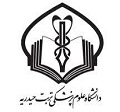(2022) Breast Cancer Screening Behaviors Based on Health Belief Model. Journal of Holistic Nursing and Midwifery. pp. 89-97.
|
Text
gums-hnmj-v32n2p89-en.pdf Download (534kB) |
Abstract
Introduction: The incidence and mortality of breast cancer will be reduced by screening. Objective: The study aimed to determine breast cancer screening behaviors based on the health beliefs model in women living in Mashhad City, Iran. Materials and Methods: This analytical cross-sectional study was conducted on 406 women referring to five health-medical centers in Mashhad from July 2018 to May 2019. They were selected by the multistage sampling method. The study data were collected with a questionnaire based on health belief model constructs consisting of two parts. The first part collects sociodemographic information. The second part is based on constructs of the health belief model (perceived susceptibility, perceived barriers, perceived severity, cues to action, and self-efficacy). The collected data were analyzed using descriptive and inferential statistics (the Smirnov-Kolmogorov, the Pearson correlation, and the Spearman test). Results: The Mean±SD age of the participants was 33.5±10.3 years, and perceived severity and perceived susceptibility of breast cancer screening behaviors were low and very low in 36.4 and 8.1 of the women, respectively. Perceived barriers were high in 70 of women; cues to action and self-efficacy were low in 57.4 and 17.2, respectively. There was a negative and significant relationship between perceived barriers and perceived benefits (P=0.001, r=-0.160). Also, there were significant statistical relationships between preventive behavior with selfefficacy (P=0.001, r=0.896) and cues to action (P=0.001, r=0.269). However, the Pearson test showed a negative and significant relationship between age and self-efficacy (P=0.001, r=-0.231). Conclusion: The present study highlights the educational programs for preventing breast cancer screening behaviors based on the health belief model. These programs should focus on increasing breast self-examination skills and understanding the perceived benefits of breast cancer screening behaviors. © 2022
| Item Type: | Article |
|---|---|
| Keywords: | Screening, Breast cancer, Health belief model, Women |
| Page Range: | pp. 89-97 |
| Journal or Publication Title: | Journal of Holistic Nursing and Midwifery |
| Volume: | 32 |
| Number: | 2 |
| Depositing User: | پریسا مرادی |
| URI: | http://eprints.thums.ac.ir/id/eprint/3718 |
Actions (login required)
 |
View Item |



